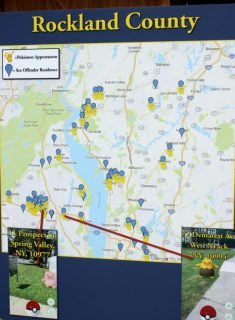“Stranger Danger” applicable to reality games
BY KATHY KAHN

One hundred million young people have already downloaded Pokémon GO to their smart phones, searching for a wild Zubat, a Pinsir or a Pikachu. The free-to-play augmented reality game encourages players to interact in their community in a new way. The problem? Many of the sites where children are playing Pokémon GO are sited near or directly in front of registered sex offenders’ residences.
New York State Senators David Carlucci (Rockland) and Jeffrey Klein (Westchester) stood in front of Rockland County Courthouse August 4 with a detailed map of Pokémon GO stops that were tracked, and the results should send up a red flag to parents and game players alike.
Within that search areas in Rockland and Westchester, 93 Pokémon characters were directly in front of residential addresses of sex offenders whose crimes involve sexual abuse or possession of child pornography. In total, the investigation found that 66 of the 100 sex offenders’ addresses were within a half-block of a Pokemon GO related items—an actual Pokemon, Pokestop and/or Gyms.
Carlucci and Klein say current NYS law needs to be updated, since augmented reality games had not been an issue when the 2008 E-stop legislation that prevented sex offenders from using social media became law. No current law places any mandate on the developer to ensure the game doesn’t send children to sex offenders’ homes.
As a result of “Protecting Our Children: How Pokemon GO and Augmented Reality Games Expose Children to Sex Offenders” on July 29, Gov. Andrew Cuomo directed the NYS Dept. of Corrections and Community Supervision to restrict sex offenders under community supervision from using Pokemon GO and other augmented reality games.
It’s not a local problem, it’s a national one. In Arizona, a Pokestop was located at the same location as a hotel that had been turned into a halfway house where 43 registered sex offenders were living. The same problem is occurring in all 50 states where the Pokemon Go craze is growing.
Jeffrey Marder of West Orange, New Jersey has taken his rage against the game a step further: He’s suing Niantic Labs, Nintendo and the Pokemon Company in California Federal court. “I’m tired of people trespassing on my property,” said the homeowner in several media reports when the suit was filed. It’s the first lawsuit against the companies who created/promoted the game but probably not the last, as hoards of tweens and teens search for the “treasures” that can add up and help them win the Pokemon Go challenge.
You Tube has also demonstrated how children are easily lured by adults into helping them capture Pokemon characters: One Millennial told two teens he was also playing the game and encouraged them to get into his car to track it down. As they approached, he asked them, “Do you know who I am? No, and I don’t think you should be getting into a car with a stranger. Play safe!” The girls were 14 and 15.
“My little girl is only three, and she knows how to use an iPad,” said Carlucci. “This is a problem for all of us, parents and children alike. While it’s great a game can encourage children to play outside more, it’s not worth the danger these augmented reality games present. We need more oversight and we need it immediately.”

You must be logged in to post a comment Login